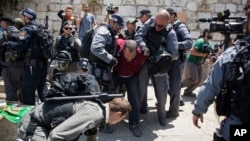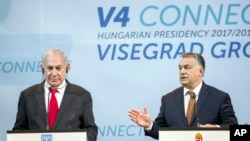Israeli Prime Minister Benjamin Netanyahu signaled Wednesday that he's sticking to a decision to install metal detectors at a contested Jerusalem shrine, despite rising tensions and a Muslim call for mass protests in the city.
Netanyahu, who was in Hungary, spoke by phone with Israeli security chiefs about the escalation in Jerusalem and was to hold more consultations after his return to Israel on Thursday.
The mass protests are set for Friday, the highlight of the Muslim religious week, when tens of thousands of Muslims typically attend prayers in the walled compound in Jerusalem's Old City.
Meanwhile, several thousand Palestinian Muslims prayed Wednesday evening in the streets near Lion's Gate, one of the entrances to the shrine that was fitted with metal detectors. Such prayers, with the faithful kneeling in orderly lines on the pavement, have been the main form of protest this week, signaling their refusal to pass through the metal detectors, but protesters have also scuffled with police.
Conflicts over the holy site, revered by Muslims and Jews, have repeatedly triggered Israeli-Palestinian confrontations. The site — known as the Temple Mount to Jews and Haram al-Sharif, or Noble Sanctuary, to Muslims — is at the heart of the Israeli-Palestinian conflict.
The latest escalation began last week when three Palestinian gunmen launched an attack from there, killing two Israeli policemen at a gate to the Muslim-administered compound.
In response, Israel began installing metal detectors, a move Muslim religious leaders and Palestinian politicians allege is part of an Israeli attempt to expand control at the site.
Israel has denied such allegations, saying metal detectors are routine security devices used at holy sites around the world.
Muslim clerics on Wednesday urged the faithful to forego prayers in neighborhood mosques in the city on Friday and converge on the shrine, in an attempt to draw larger crowds. Worshippers were asked to pray in the streets rather than submit to the new security procedures.
Netanyahu spoke to Israeli security chiefs by phone on Wednesday.
“There is no change regarding the metal detectors,” he told reporters in Budapest.
Israeli media reported that security chiefs are at odds over the new devices. Israel's Shin Bet security service, which closely monitors Palestinian society, reportedly opposes the metal detectors as counterproductive, while police support the new measures.
Netanyahu said Israel is in close contact with Jordan, the traditional Muslim custodian of the shrine. Netanyahu said Jordan wants to “end this as quietly as possible.”
“We expected everyone to help restore calm,” he said.
Netanyahu rejected Muslim allegations that Israel is changing long-standing arrangements at the shrine.
“We should look at the facts and the truth — the installation of metal detectors does not constitute any change in the status quo,” he said. “It is only meant to prevent a repeat of an attack with weapons.”
Jordanian Foreign Minister Ayman Safadi said the key to restoring calm is to have Israel respect the "historic and legal status'' at the shrine, the state news agency Petra reported.
Safadi told ambassadors from Europe and Asia that ending tensions is in the hands of Israel which he said should immediately reopen the shrine without any hindrances.
Palestinian President Mahmoud Abbas, who was in China, is returning to the West Bank to deal with the crisis, his office said in a statement.
In the meantime, Abbas is in touch with Arab and international leaders to try to “prevent a deterioration of the situation,” it said.
After last week's shooting, Israel closed the site for two days for searches. It was only the third closure since Israel captured the shrine, along with east Jerusalem and other territories, in the 1967 Mideast war.
The closure drew wide condemnation from the Muslim world. Israel began opening the site gradually on Sunday.
Jews revere the 37-acre raised platform as the site of their biblical temples. It is the holiest site in Judaism and the nearby Western Wall, a remnant of one of the temples, is the holiest place where Jews can pray.
Muslims believe the hilltop marks the spot from which the Prophet Muhammad ascended to heaven. It is Islam's third-holiest site after Mecca and Medina in Saudi Arabia.






